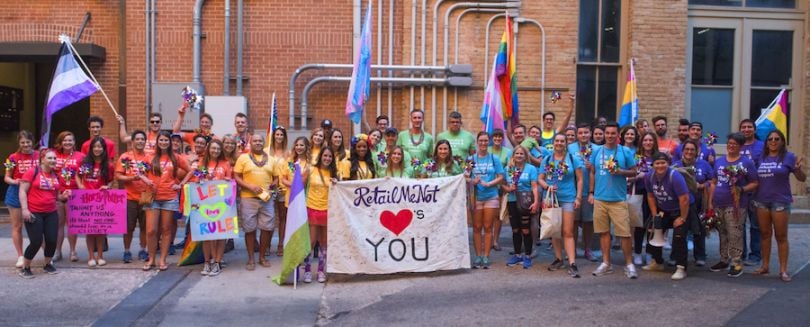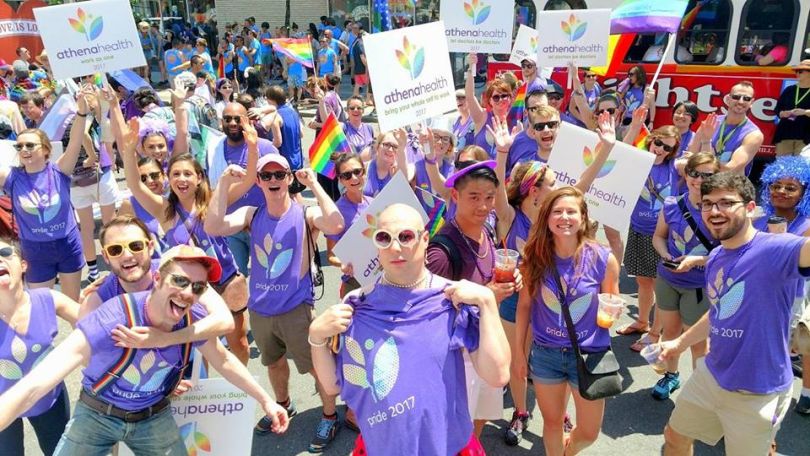Many companies aspire to build diverse, inclusive workplaces, but making that goal a reality requires forethought — and a lot of hard work. To learn more about how Austin tech is taking on that challenge, we spoke with leaders at four companies about their ongoing initiatives.

Atlassian has developed a comprehensive set of diversity and inclusion programs focused on opportunity. The company has a dedicated page on its website for reporting on the progress they’ve made, what programs are in place and what areas they are focusing on next. We spoke with three team members heading up those efforts about the company's work toward a more inclusive culture.
How do you promote diversity, both within your team and in the broader tech ecosystem?
We've strengthened standards and structure within our interview process to mitigate potential bias and help us find the right members of the team. For example, we’ve shifted from a "culture fit" interview to a "values fit" interview, and we require that a diverse slate of candidates is interviewed for all of roles at the director level and above. We also sponsor learning and development programs for our employees and offer benefits that support the unique needs of all of our employees.
All of our efforts around diversity are centered on the concept of opportunity. We know that people from certain backgrounds and identity groups are significantly less likely to be given opportunities to reach their potential, and we see it as our mission to remove those roadblocks, especially for access to careers in STEM. That's why we invest our time and money in partnerships with organizations that promote learning and advancement of marginalized communities in the tech sector.
In Austin, we partner with organizations like Galvanize by providing scholarships for black, Latina and indigenous women to participate in a 6-month full-stack development boot camp, which trains individuals for junior-level developer positions. We also regularly host mentor circles and employee affinity groups, and we participate in Austin Pride.
How did these initiatives come to be?
At its most basic level, it makes us a better company. Overcoming decades of tech industry "truth" about talent, potential and who belongs requires a huge paradigm shift. It’s one that we need everyone on board with. The key is to provide opportunities for all to learn how diversity makes them stronger contributors and how to be the most inclusive versions of themselves. Education is the key to making our diversity and inclusion efforts stick.
What are some lessons you learned while implementing them?
We've certainly been learning things along the way. For example, we haven't yet developed a strong, direct signal of inclusion specifically for teams. Our team diversity data suggests where inclusion is a challenge for us, but we don't feel it's specific enough.
For example: We have low representation of women in technical roles, yet most of our software teams have at least one woman on them. This suggests many of these women are likely the only woman on their teams, and therefore may be struggling with a sense of belonging. For this reason, we're exploring new ways to address diversity specifically on the team level as well as on the company level. By focusing more granularly, we feel we can increase representation, but also belonging, which is an important criteria.

To reflect the perspectives of its employees and customers, RetailMeNot has made diversity and inclusivity one of its core company values. Christine McCarey, who is the company’s head of diversity and inclusion, said RetailMeNot promotes those values through grassroots initiatives supported by the company’s leadership team. In addition to internal initiatives, the company partners with a range of local organizations to promote inclusivity in the broader tech community.
How do you promote diversity, both within your team and in the broader tech ecosystem?
In less than one year, we have launched and scaled a multi-department, multi-level diversity and inclusion council and seven employee resource groups led by emerging leaders in our organization. Our diversity and inclusion council and ERGs partner amongst themselves and with our corporate giving program, RMN Gives, to actively engage in community and industry outreach efforts. We have partnered with Blacks in Technology, Hello World, Out Youth, Code2College and AnitaB.Org Austin. Thanks to our legal team, we also support initiatives like Keep Texas Open for Business.
The program also partners with our people team to implement unconscious bias interrupters. For example, we have an unconscious bias program that includes in-person and online trainings. We measure their impact through pre- and post-training surveys. We have also implemented an enterprise-wide software tool to help neutralize language in our job descriptions and attract a more diverse candidate pool.
How did those initiatives come to be?
Our diversity and inclusion program started with a realization that our leadership needed to reflect our internal demographics and our customer base. This work began as a women’s initiative, but it quickly pivoted to be more inclusive. I credit our CEO, Cotter Cunningham, and our chief legal officer, Jonathan Kaplan, for creating the space for that to happen.
In just about one year, we went from identifying a need for a diversity and inclusion program to a full launch with a roadmap, ERGs in place and executive buy-in. While incredibly fast in turnaround, the program was thoroughly researched and thought out.

Taking a broad view of diversity, athenahealth has made an effort to consider ability, introversion, cultural heritage, socio-economic status, veteran status and parenthood alongside commonly discussed factors like ethnicity, race, gender and sexual orientation. Members of the Austin chapter of the athenahealth diversity council filled us on how their team encourages inclusion both in and outside of the office.
How do you promote diversity, both within your team and in the broader tech ecosystem?
We have multiple internal initiatives. We host “Hot Topic” events where we discuss issues relevant to our work and society. Throughout the office, we hang posters featuring cool diversity facts, and we also host Jeffersonian Dinner discussions. External of athena, we volunteer at Girls Who Code, Refugee Services of Texas and AGE of Central Texas. We also actively look for awesome new athenistas at diversity-themed events, like the Tech Jobs Tour and the Grace Hopper Celebration.
How did those initiatives come to be?
I’m happy to say that they came about organically. There are so many people in our office who care passionately about issues of diversity and want to discuss them, which led to the formalization of a lot of efforts that were already happening in pockets around the campus. We ultimately synced our office grassroots efforts with those happening at other athena campuses and became part of the company-wide athenaDiversity Council.
What are some lessons you learned while implementing them?
Most people care greatly about diversity initiatives taking place at their companies — but they still have their full-time jobs, too. What employees need most is to be provided with easy and accessible opportunities to contribute. That’s why it’s so important to have a leadership team built right into our office that creates volunteer opportunities, internal initiatives and other ways to get involved.

In the view of Christina Luconi, Rapid7’s chief people officer, true innovation requires a workforce that holds a range of eclectic perspectives. To her, focusing on diversity and inclusion is just as much about achieving the company's business goals as it is about doing the right thing.
How do you promote diversity, both within your team and in the broader tech ecosystem?
Candidly, we've always had a fairly inclusive culture. We have a large variety of people representing an abundance of different communities. However, we have become very mindful and intentional about the amount of thought and energy we put into how we attract a broader variety of people to our company, and the diversity of people they experience throughout the interview process. In essence, it's an all-hands-on-deck effort to ensure we are reaching the best possible people — wherever they might be.
How did those initiatives come to be?
We started by doing an in-depth analysis of diversity within the company through the help of our business intelligence team, both holistically and by team. Those results ultimately led to the creation of our 50/50 by 2020 initiative. This means we are driving for our workforce to consist of 50 percent women and underrepresented minorities by 2020. We realize that's a big challenge to hit in our industry, but it's challenging us to reimagine the way we attract, recruit and develop the incredible talent that comes to work at Rapid7. We aim to level the playing field in our industry, not accept the status quo.
What are some lessons you learned since starting that initiative?
We are just getting started, but the biggest lesson learned so far is that to really achieve this goal, we need to inspire every person in the company to understand the role they can play in making it happen. This means not only broadening their mindsets in terms of what makes for an amazing team member, but ensuring every person who joins their team is made to feel embraced and included. In addition, sharing this overall goal and continuing to be transparent about the progress we make will be critically important to keeping this initiative top of mind.




